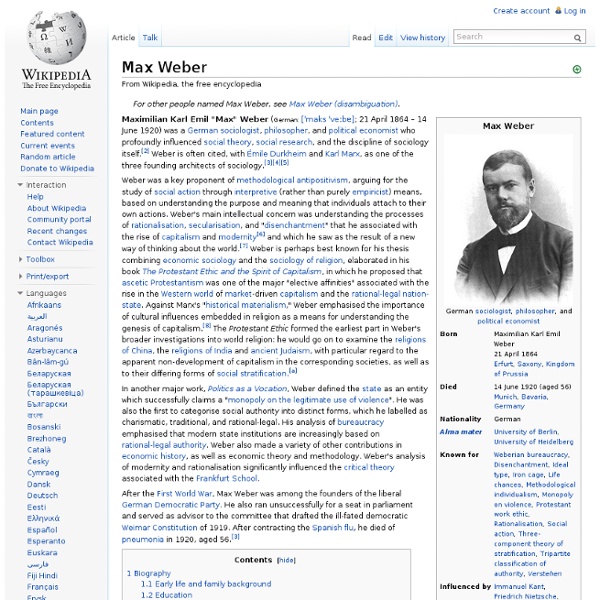Max Weber

Reflexivity (social theory)
Reflexivity refers to circular relationships between cause and effect. A reflexive relationship is bidirectional with both the cause and the effect affecting one another in a situation that does not render both functions causes and effects. In sociology, reflexivity therefore comes to mean an act of self-reference where examination or action "bends back on", refers to, and affects the entity instigating the action or examination. In Economics reflexivity refers to the self-reinforcing effect of market sentiment, whereby rising prices attract buyers whose actions drive prices higher still until the process becomes unsustainable and the same process operates in reverse leading to a catastrophic collapse in prices. It is an instance of a feedback loop. Reflexivity is, therefore, a methodological issue in the social sciences analogous to the observer effect. Sociologist Robert K. Michel Foucault's The Order of Things can be said to touch on the issue of Reflexivity.
Blackwell Publishing Online
Renaissance humanism
Humanism is the resurgent study of classical antiquity, at first in Italy, and then spreading across Western Europe in the 14th, 15th and 16th centuries. The terms Renaissance (rinascimento "rebirth") for this movement, and "humanist" (whence modern humanism; also Renaissance humanism to distinguish it from later developments grouped as humanism) are contemporary to that period.[1] Renaissance humanism was a response to the utilitarian approach and what came to be depicted as the "narrow pedantry" associated with medieval scholasticism.[2] Humanists sought to create a citizenry able to speak and write with eloquence and clarity and thus capable of engaging the civic life of their communities and persuading others to virtuous and prudent actions. This was to be accomplished through the study of the studia humanitatis, today known as the humanities: grammar, rhetoric, history, poetry and moral philosophy. According to one scholar of the movement, Origins[edit] Humanists[edit] See also[edit]
Related:
Related:




Pel que fa a Weber, has après alguna cosa bona? by latent Apr 22